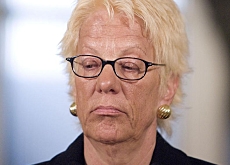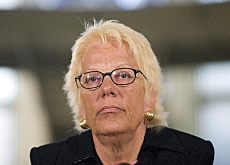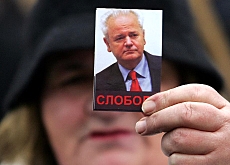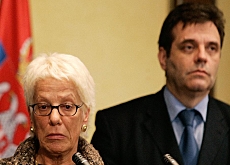Milosevic case offers lessons for justice

UN war crimes prosecutor, Switzerland's Carla Del Ponte, failed to convict Slobodan Milosevic but helped international justice, a law expert tells swissinfo.
Professor Kai Ambos of the Institute for Criminal Law and Criminal Justice at the University of Göttingen, Germany, says the work of the Tribunal will not be judged on the Milosevic case.
The United Nations International Criminal Tribunal for the Former Yugoslavia (ICTY) officially put the Milosevic case to rest on Tuesday.
After four years on trial, the most wanted war crimes suspect in Europe since the Second World War died an “innocent” man.
Milosevic’s death on Saturday raises questions about the manner of his prosecution, as well as the progress of the ICTY under Del Ponte.
Critics say she should have limited the charges against him rather than seeking to try him for war crimes in Croatia, Bosnia and Kosovo.
swissinfo: Did Del Ponte make a mistake by throwing the book at Milosevic? Would it not have been better to limit the charges against him to ensure he was successfully prosecuted within a reasonable amount of time?
Kai Ambos: It is certainly true that it would have been better if she had split up the three major “complexes” – Croatia, Bosnia and Kosovo – and started with only one of them. Maybe we would then have at least one judgement now.
swissinfo: Does Milosevic’s death weaken Del Ponte’s chances of bringing the former leader of the Bosnian Serbs, Radovan Karadzic, and his general Ratko Mladic to the Hague?
K.A.: No, I don’t think the issues are related. I think Milosevic’s death has more internal consequences for Serbia than for anything else.
As to the ICTY, there are so many cases going on, and many judgements have already been handed down so the historic work of the ICTY does not really depend on the finishing of the Milosevic case.
I would not overstate its importance. There are other cases which in terms of the historic account are equally or even more important.
swissinfo: Has the ICTY done a good job then? Is it working as it should?
K.A.: It’s all relative. If you compare this tribunal with any of the other international criminal tribunals, from Nuremburg to Iraq, I would say that the ICTY is a success, especially when one examines the enormous case law it has produced. I’m referring here also to its legal professionalism, the compliance with the fair trial principle, the workload, and the effectiveness and efficiency of the tribunal.
If you look at the International Criminal Court (ICC), whose statute was adopted in 1998, the work of the ICTY in particular had a huge impact on the statute and the other instruments. So in a legal sense international criminal law has certainly profited a lot from the ICTY.
In political terms, the general problem with tribunals of this kind is that they are far away from where the crimes were committed. But the question is whether the establishment of a tribunal in the country concerned is always a better solution.
If one takes the case of Iraq, for instance, there the security of the defence lawyers cannot even be guaranteed.
swissinfo: The tribunal is supposed to wrap up its work by 2010. At the rate of progress seen so far, does that look like a realistic deadline?
K.A.: I don’t think this date – set by the UN Security Council – is totally set in stone. If important trials were still going on, they would very likely rethink the date.
In that case, it would be absurd if the United States and the European Union were not to let the tribunal finish its work. To close the tribunal without, for example, putting Karadzic and Mladic in the dock would cause greater harm politically than to run it for six more months or so.
The core problem is economic. The ad hoc tribunals are transitional ones and the Europeans especially do not see much sense in spending money on such tribunals if we have an ICC, which supposedly has more legitimacy in legal and political terms. But still I think there has to be flexibility in terms of balancing the need to finish the work of the ICTY, and the economic constraints.
swissinfo-interview: Jonas Hughes
Del Ponte brought 66 counts of genocide, crimes against humanity and war crimes against Slobodan Milosevic.
He was charged with committing the crimes between 1991 and 1999 in Croatia, Bosnia and Kosovo.
In 2004, Milosevic argued unsuccessfully that the charges should be dropped for lack of evidence.
Del Ponte maintains the trial, which started in 2001, would likely have been completed by mid-year.
Carla Del Ponte, 58, was born in Lugano, Switzerland, and is currently chief UN war crimes prosecutor.
A lawyer by training, she has been an investigating magistrate as well as public prosecutor in Lugano and Swiss federal prosecutor.
In September 2007 Del Ponte’s second four-year term will end and the UN will decide whether to give extend her mandate for another four years.
She receives her salary from the UN, but the Swiss government contributes towards her security arrangements.

In compliance with the JTI standards
More: SWI swissinfo.ch certified by the Journalism Trust Initiative



You can find an overview of ongoing debates with our journalists here . Please join us!
If you want to start a conversation about a topic raised in this article or want to report factual errors, email us at english@swissinfo.ch.